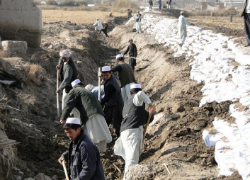
(Action Aid)
On March 2, 2013, the American Branch of the International Law Association held its Western Regional Conference on International Law and Human Security in the 21st Century. The conference was held at the University of Denver Sturm College of Law in Denver, Colorado. The third panel of the day was on Human Security and Human Rights. The chair of the panel was Professor James A.R. Nafziger. The speakers were Professor Upendra D. Acharya, Professor Claude d’Estree, and Professor Linda A. Malone. Mr. Andrew Reid served as the panel discussant.
Professor Nafziger received his B.A. and M.A. from the University of Wisconsin and his J.D. from the Harvard Law School. Professor Nafziger currently serves as the Thomas B. Stoel Professor of Law and Director of International Programs at Willamette University College of Law. He is also Honorary Professor at the East China University of Politics and Law. Professer Nafziger’s presentation for the conference was entitled Immigration Through the Lens of International Law. The presentation focused on how international law helps us overcome the nearsightedness of immigration law. Professor Nafziger stated that immigration is more than just a hot topic at the top of the U.S. national agenda in Washington D.C. but it is also a major focus in security and human rights.
Professor Acharya holds a S.J.D. from the University of Wisconsin Law School; an LL.M. from the University of Utah College of Law; an M.C.L. from the University of Delhi, India; and an LL.B. from Tribhuvan University, Kathmandu, Nepal. He is currently a Professor of Law at Gonzaga University School of Law. Professor Acharya’s presentation for the conference was entitled Human Rights and Human Security: Consonance or Dissonance? The presentation focused on answering the question of whether human rights and human security are the same thing and if they are complimentary to each other. The current situation and statistics from Libya were of a particular focus.
Professor d’Estree is a graduate of Harvard Divinity School, and he received his J.D. from Northeastern University School of Law. He is Director of the Human Trafficking Clinic, the Center on Rights Development, and the Humans Rights Degree Program at the Josef Korbel School of International Studies at the University of Denver. Professor d’Estree’s conference presentation was entitled Forced Labor and Human Trafficking: the Return to the Old Scourge of Slavery. The focus of the presentation was on forced labor a.k.a. slavery, which is still practiced around the world today with about 20.9 million people currently serving as forced labor. This is also a problem in America with between 14,500-17,500 people traded across the American border annually. He also discussed the causes, conditions, and cures of the forced labor and human trafficking crisis.
Professor Malone received her B.A. from Vassar and her J.D. from Duke. She is currently the Marshall-Wythe Foundation Professor of Law and Founding Director of the Human Security Law Center at the College of Willam and Mary School of Law. Professor Malone’s conference presentation was entitled The Responsibility to Protect Civilian Populations. The presentation discussed the legal norms on the responsibility to protect, which includes the prevention of crimes against civilians, and the difference between the responsibility to protect vs. humanitarian intervention. There was a particular focus on the difficulties in Syria.
Mr. Reid received his J.D. from the University of Oklahoma and, in addition to his current trial and appellate advocacy, he teaches as an adjunct Professor at the University of Denver Sturm College of Law. Mr. Reid began by noting that no one who had spoken during the day had defined human security, the topic of the conference. He noted that though there are many factors to human security it basically comes down to two things – freedom from fear, such are war and death, and freedom from wants, such as food, shelter, and the ability to participate in government.
Sarah Emery is a 2L and is the Business Editor of the Denver Journal of International Law & Policy.


